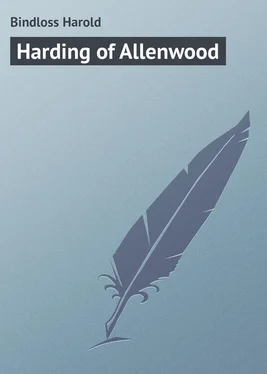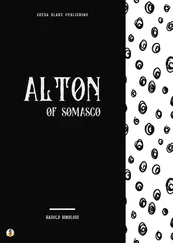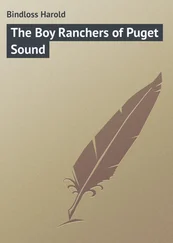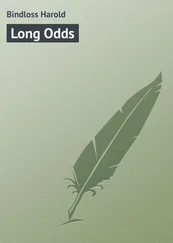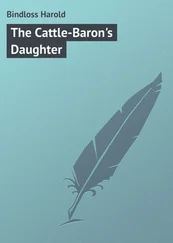Harold Bindloss - Harding of Allenwood
Здесь есть возможность читать онлайн «Harold Bindloss - Harding of Allenwood» — ознакомительный отрывок электронной книги совершенно бесплатно, а после прочтения отрывка купить полную версию. В некоторых случаях можно слушать аудио, скачать через торрент в формате fb2 и присутствует краткое содержание. Жанр: foreign_prose, на английском языке. Описание произведения, (предисловие) а так же отзывы посетителей доступны на портале библиотеки ЛибКат.
- Название:Harding of Allenwood
- Автор:
- Жанр:
- Год:неизвестен
- ISBN:нет данных
- Рейтинг книги:3 / 5. Голосов: 1
-
Избранное:Добавить в избранное
- Отзывы:
-
Ваша оценка:
- 60
- 1
- 2
- 3
- 4
- 5
Harding of Allenwood: краткое содержание, описание и аннотация
Предлагаем к чтению аннотацию, описание, краткое содержание или предисловие (зависит от того, что написал сам автор книги «Harding of Allenwood»). Если вы не нашли необходимую информацию о книге — напишите в комментариях, мы постараемся отыскать её.
Harding of Allenwood — читать онлайн ознакомительный отрывок
Ниже представлен текст книги, разбитый по страницам. Система сохранения места последней прочитанной страницы, позволяет с удобством читать онлайн бесплатно книгу «Harding of Allenwood», без необходимости каждый раз заново искать на чём Вы остановились. Поставьте закладку, и сможете в любой момент перейти на страницу, на которой закончили чтение.
Интервал:
Закладка:
She asked him a few questions about his farm, which he answered pleasantly. They were walking side by side along one of the prairie trails, and he was leading the horse. The breeze had fallen and the night was unusually still, broken only by a coyote calling insistently to his mate; the wide, bare prairie ahead of them lay bathed in moonlight.
Presently a light twinkled across the plain; and Beatrice welcomed it, because, in spite of the precautions she had taken, her long skirt was wet and uncomfortable.
When they reached the camp they found Hester busy cooking at a fire. Behind her stood a rude board shelter and a tent, and farther off the skeleton of a house rose from the grass.
Beatrice studied Hester Harding with interest. Though she found her simply dressed, with sleeves rolled back and hands smeared with flour, the prairie girl made a favorable impression on her. She liked the sensitive, grave face, and the candid, thoughtful look.
While the girth was being mended, the girls talked beside the fire. Then Harding saddled his own horse, and he and Beatrice rode off across the prairie. When the lights of the Grange were visible he turned back; and soon afterward Beatrice was laughingly relating her adventure to her mother and Lance.
"So it was Harding who helped you!" Lance exclaimed. "I made a rather bad blunder in talking to him the other day – told him he mustn't cut some timber which it seems was his. But, I must say, he was rather decent about it."
He looked at his sister curiously, and then laughed.
"On the whole," he added, as she started up the stairs, "it might be better not to say anything about your little experience to the Colonel. I'm inclined to think it might not please him."
Beatrice saw that her mother agreed with Lance, and she was somewhat curious; but she went on up to her room without asking any questions.
She began to feel interested in Harding.
CHAPTER IV
THE OPENING OF THE RIFT
A week after his meeting with Beatrice Mowbray, Harding went out one morning to plow. He was in a thoughtful mood, but it was characteristic that he did not allow his reflections to interfere with his work. His house was unfinished, and the nights were getting cold; but neither Hester nor he placed personal comfort first, and there was a strip of land that must be broken before the frost set in.
It was a calm morning and bright sunshine poured down upon the grass that ran back, growing faintly blue in the distance, until it faded into the mellow haze that shut in the wide circle of prairie. Here and there the smooth expanse was broken by small, gleaming ponds and wavy lines of timber picked out in delicate shades of indigo and gray, but the foreground was steeped in strong color. Where the light struck it, the withered grass shone like silver; elsewhere it was streaked with yellow and cinnamon. The long furrows traced across it were a rich chocolate-brown, and the turned-back clods had patches of oily brightness on their faces. The leaves in a neighboring bluff formed spots of cadmium; and even the big breaker plow, painted crude green and vermilion, did not seem out of place. It was a new implement, the best that Harding could buy, and two brawny red oxen hauled it along. Oxen are economical to feed and have some advantages in the first stages of breaking land, but Harding meant to change them for Clydesdale horses and experiment with mechanical traction. He used the old methods where they paid, but he believed in progress.
As he guided the slowly moving beasts and watched the clods roll back, his brown face was grave; for he had been troubled during the past seven days. When he looked up at Beatrice Mowbray on the river bank something strange and disturbing had happened to him. He was not given to indulgence in romantic sentiment and, absorbed as he had been, first by the necessity of providing for his sister and himself, and afterward by practical ambitions, he had seldom spared a thought to women. Marriage did not attract him. He felt no longing for close companionship or domestic comfort; indeed, he rather liked a certain amount of hardship. True, his heart had once or twice been mildly stirred by girls he had met. They were pretty and likable – otherwise he would not have been attracted, for his taste was good.
In some respects, Harding was primitive; but this, perhaps, tended to give him a clearer understanding of essential things, and he had a vague belief that he would some day meet the woman who was destined to be his true mate. What was more, he would recognize her when he saw her.
And when he had looked up at Beatrice in the moonlight, standing out, clear cut, against the somber background of poplars, the knowledge that she was the one woman had rushed over him, surging through him as strong as the swift-running river through which he had brought her. But, now that the thing had happened, he must grapple with a difficult situation. He knew his own value, and believed that he had abilities which would carry him far toward material success; but he also knew his limitations and the strength of the prejudices that would be arrayed against him. That he should hope to win this girl of patrician stock was, in a sense, ludicrous. Yet he had read courage in her, and steadfastness; if she loved him, she would not count too great any sacrifice she made for his sake. But this was only one side of the matter. Brought up as she had been, she might not stand the strain of such a life as his must be for a time. A deep tenderness awoke within him; he felt that she must be sheltered from all trouble and gently cared for.
Harding suddenly broke into a grim laugh. He was going much too fast – there was no reason to believe that the girl had given him a passing thought.
With a call to the oxen he went on with his plowing, and the work brought him encouragement. It was directly productive: next fall the prairie he ripped apart would be covered with ripening grain. He had found that no well-guided effort was lost: it bore fruit always – in his case, at the rate of twenty bushels of wheat, or fifty bushels of oats, to the acre. When the seed was wisely sown the harvest followed; and Harding had steadily enlarged his crop. Now he had made his boldest venture; and he looked forward to the time when his labor should change the empty plain into a fertile field.
A jolt of the plow disturbed him, and as he looked up the oxen stopped. The share had struck hard ground. On one side, a sinuous line of trail, rutted by wheels and beaten firm by hoofs, seamed the prairie; on the other, the furrows ran across and blotted it out. It was a road the Allenwood settlers used, and Harding knew well what he was doing when he plowed into it. Still, the land was his and must produce its proper yield of grain, while to clear the trail with his implements would entail much useless labor. He had no wish to be aggressive, but if these people took his action as a challenge, the fault would be theirs. It was with a quiet, determined smile that he called to the oxen and held down the share.
At noon he turned the animals loose, and going back to camp, felt his heart throb as he saw Beatrice Mowbray talking to Hester. A team stood near by, and the boy he had met in the bluff was stooping down beside a light four-wheeled vehicle. Beatrice gave Harding a smile of recognition and went on talking, but her brother came up to him.
"The pole came loose," he explained; "and I thought you might lend me something to fasten it with."
"Certainly," Harding said, stooping to examine the damaged pole. "It won't fasten," he added. "It's broken between the iron straps, and there's not wood enough to bolt them on again."
Lance frowned.
"That's a nuisance!"
"I will give you a pole," Harding said. "There is some lumber here that will do."
Читать дальшеИнтервал:
Закладка:
Похожие книги на «Harding of Allenwood»
Представляем Вашему вниманию похожие книги на «Harding of Allenwood» списком для выбора. Мы отобрали схожую по названию и смыслу литературу в надежде предоставить читателям больше вариантов отыскать новые, интересные, ещё непрочитанные произведения.
Обсуждение, отзывы о книге «Harding of Allenwood» и просто собственные мнения читателей. Оставьте ваши комментарии, напишите, что Вы думаете о произведении, его смысле или главных героях. Укажите что конкретно понравилось, а что нет, и почему Вы так считаете.
